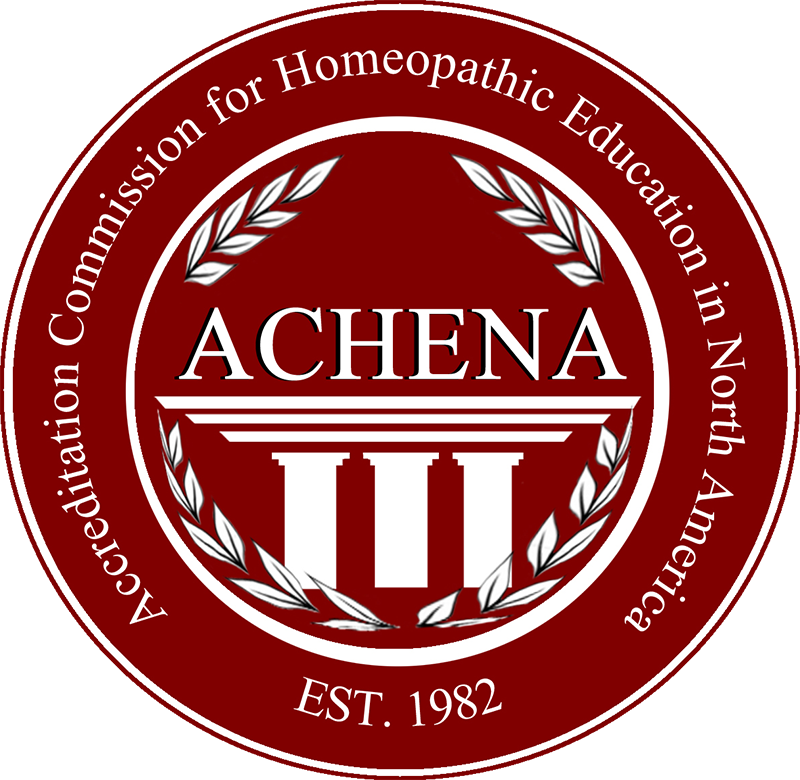Accreditation Standards
The fundamental principles of postsecondary accreditation are to formulate and implement policies for professional training and education at institutions of higher learning (i.e. beyond the high school level). To ensure equitable application of these principles, accreditation agencies must balance board representation by appointing members who represent the profession as educators, practitioners and students; represent allied health professionals; represent the public; and reflect the individual and cultural diversity within society and the discipline seeking accreditation. For School Accreditation Implementation Documents and ACHENA Standards and Competencies, click here.
ACHENA Standards of Excellence and Competencies in Homeopathy
Relative to ACHENA’s mission and standards of excellence, the accreditation process assesses the extent to which a professional homeopathic school or program successfully achieves its stated program mission, goals, objectives, as well as its student learning outcomes, as measured against the established Standards for Homeopathic Education and Competencies.
Components of Accreditation
Community-Accepted Standards.
Accredited schools meet widely accepted and valid standards of education and training established by the field of homeopathy through a well-documented, public deliberation process. Based on those standards, schools in the public domain agree to demonstrate that they provide students with a meaningful learning experience. Accreditation by ACHENA must ensure that the:
- Student resources are adequate and provide meaningful learning experiences
- Curriculum is comprehensive and up-to-date
- Faculty is well qualified
- Student grading is fair and unbiased
- Consumer protection is upheld by highly qualified educators and graduates
Peer Review.
Peer reviews are conducted by ACHENA professionals who are knowledgeable about setting standards of higher learning and committed to supporting the growth of the school under review. A peer review involves a site visit to provide a school applying for accreditation an opportunity to receive a systematic review of their program with experienced educators or administrators of higher learning.
Self Study.
ACHENA accreditation allows for a forum within which the school or program engages with its own community. This allows for a process of self-reflection and evaluation of its school mission and principles, and supports growth that is based on a flexible and innovative formula of professional homeopathic training and education.
Established Policies and Procedures.
ACHENA accredited schools and programs establish documented policies and procedures to ensure that students, faculty and administrators fully understand the scope of their rights, responsibilities and how they will work together to promote excellence in professional training, education and practice.
ACHENA Seeking United States Department of Education Recognition.
ACHENA accredited schools have successfully demonstrated that they meet peer reviewed standards of excellence in homeopathic education and training. USDE recognition would mean ACHENA accredited schools additionally demonstrate that they meet nationally reviewed standards of excellence. This would allow ACHENA accredited homeopathic schools to become eligible for federal student loans, student visas and other funding on behalf of the students they serve, including consumer protections under the law. ACHENA will continue to function as an independent, peer-monitored agency with established standards of due process and transparency. For more information about nationally recognized accreditation for colleges of higher education, visit the U.S. Department of Education.
ACHENA Accreditation Process
The ACHENA accreditation process consists of two distinct, yet related processes:
- The Eligibility Process – objective: Candidacy for Accreditation
- The Self-Study Process – objective: Accreditation
Prerequisite School/Program Structure
The school or program structure must first include any or all of the following:
Program Type
- Master’s Degree in Homeopathy, Professional Homeopathic Practitioner certificate or diploma programs, or a Doctoral Degree in Homeopathy.
- Freestanding institution or college of homeopathy that offers such programs
- Schools that prepare professional homeopathic practitioners via educational programs that are at least 1,000 hours in length
Program Format
- In-person, classroom-based
- Distance learning only (View Distance Learning Standards here)
- Blended learning (i.e. in-person and distance learning)
Program Content
- Schools or programs that teach the art and science of Hahnemannian homeopathy, as set out in the 5th and 6th eds. of The Organon. Principles generally accepted as “classical” by the homeopathic community at large include – using a single homeopathic remedy, in a minimum dose according to the Law of Similars, and based on a totality of symptoms. This philosophy must be evidenced in the teaching and clinical curriculum.
Five procedural steps guide the Eligibility and Accreditation process.
ACHENA intends to set its accreditation policies, procedures and guidelines consistent with nationally recognized principles of accreditation. For all related ACHENA accreditation documents and specific instructions and guidance in completing an ACHENA application for accreditation, please go to ACHENA Resources.
School submits a Letter of Intent and 2-page application.
School attends an Eligibility workshop and then prepares and submits an Eligibility Packet.
ACHENA reviews the Eligibility Packet. When a school documents that it meets eligibility standards, it is granted Candidacy Status.
Candidate School attends a Self-Study Preparation Workshop and then conducts and submits a Self-Study report.
Site visit conducted by a team of Peer Reviewers. Peer Reviewer prepare a Site Visit Report.
ACHENA Standards Committee reviews the Self-Study and Peer Review Report.
ACHENA Commissioners consider Peer Review Report and Standards Committee Recommendation and votes to determine accreditation status.
ACHENA School Accreditation Fees
For details about all fees required to complete, and/or renew ACHENA accreditation, review the School Accreditation Fee Schedule
Thank you for supporting ACHENA by getting involved!
Please partner with ACHENA and give generously to help homeopathic education prosper and continue to grow stronger. Your tax-deductible donation supports our mission to improve the quality of homeopathic education programs and improve consumer protection.
ACHENA | [email protected]
P.O. BOX 517 | 49 ELMWOOD ROAD | SWAMPSCOTT, MA 01907
